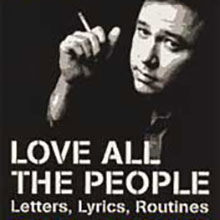
 This advice from comedian Bill Hicks (who died of cancer in 1993) is applicable to many other activities besides stand-up comedy.
This advice from comedian Bill Hicks (who died of cancer in 1993) is applicable to many other activities besides stand-up comedy.
- If you can be yourself on stage nobody else can be you and you have the law of supply and demand covered.
- The act is something you fall back on if you can’t think of anything else to say.
- Only do what you think is funny, never just what you think they will like, even though it’s not that funny to you.
- Never ask them is this funny – you tell them this is funny.
- You are not married to any of this shit – if something happens, taking you off on a tangent, NEVER go back and finish a bit, just move on.
- NEVER ask the audience “How You Doing?” People who do that can’t think of an opening line. They came to see you to tell them how they’re doing, asking that stupid question up front just digs a hole. This is The Most Common Mistake made by performers. I want to leave as soon as they say that.
- Write what entertains you. If you can’t be funny be interesting. You haven’t lost the crowd. Have something to say and then do it in a funny way.
- I close my eyes and walk out there and that’s where I start, Honest.
- Listen to what you are saying, ask yourself, “Why am I saying it and is it Necessary?” (This will filter all your material and cut the unnecessary words, economy of words)
- Play to the top of the intelligence of the room. There aren’t any bad crowds, just wrong choices.
- Remember this is the hardest thing there is to do. If you can do this you can do anything.
- I love my cracker roots. Get to know your family, be friends with them.
I would modify this list for screenwriters–
- We’ve been telling stories for eons. There are no new stories. The only thing that make you commercial (or unique) is your voice and your perspective.
- How can you tell the story in a new way? Don’t fall back on cliches.
- Never follow the market. Tell stories that excite you– not ones you think the market wants to buy.
- Tell the market yours is a great story by how you tell it.
- Don’t keep going back and rewriting old bits every day, just move on. Finish the story. Let the first draft be crappy. Or you won’t ever have a first draft.
- Just jump right into the story. Don’t waste time with long introductions or back story.
- Write what entertains you. Be interesting. Have something to say and then say it in a uniquely personal way.
- I close my eyes and walk out there and that’s where I start, Honest.
- Read what you are are writing, ask yourself, “Why am I telling this and is it Necessary?” (This will filter all your material and cut the unnecessary words, economy of words).
- Play to the top of the intelligence of the reader or viewer. There aren’t any bad audiences, just wrong choices.
- Remember this is the hardest thing there is to do. If you can do this you can do anything.
- I love my own Wisconsin roots. Get to know your family, be friends with them. Learn from the storytelling of your tribe.






No comment yet, add your voice below!